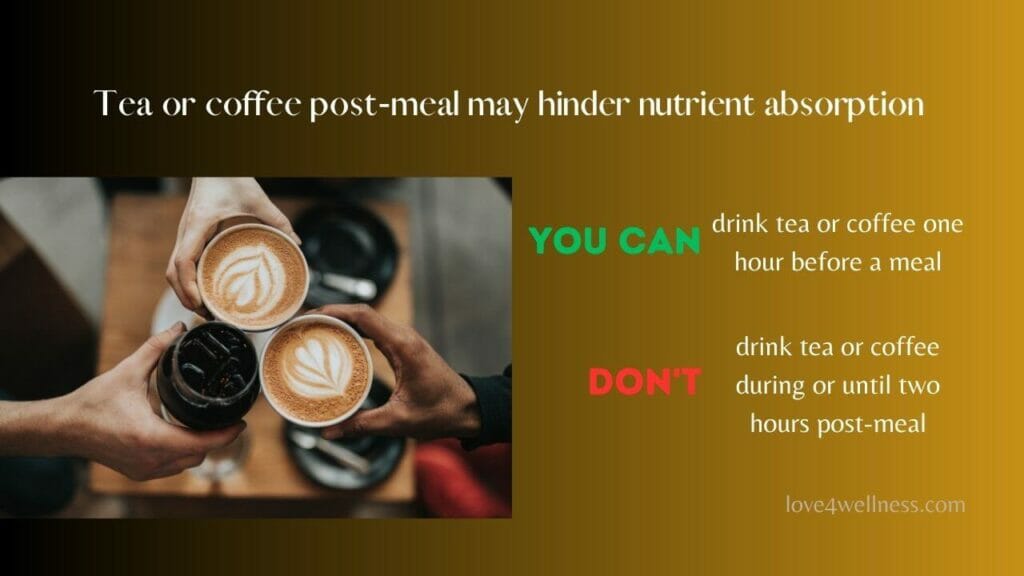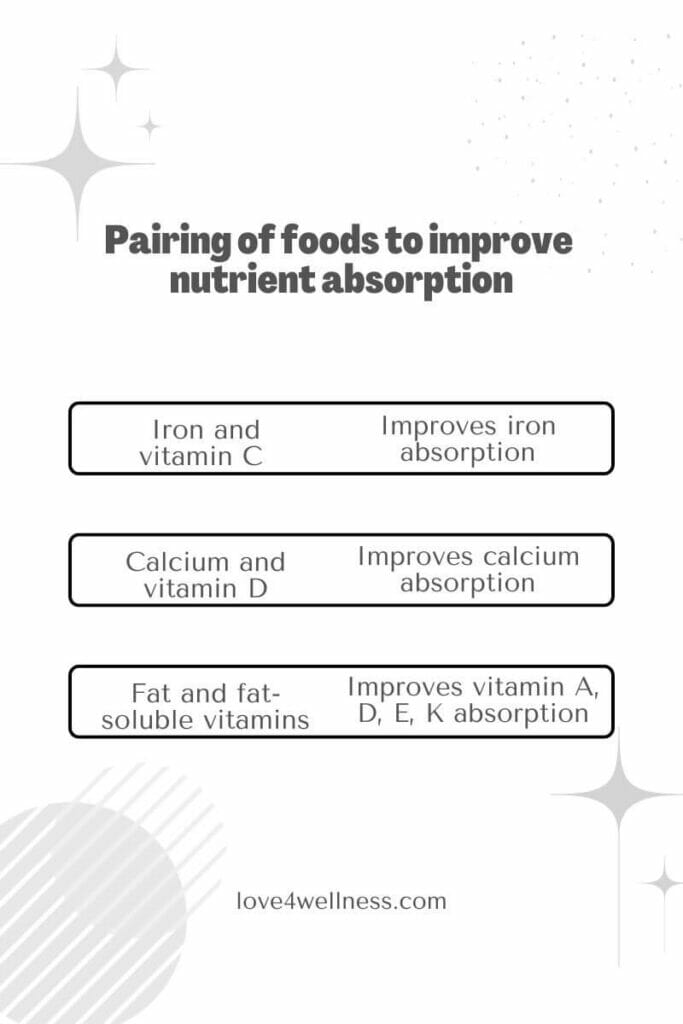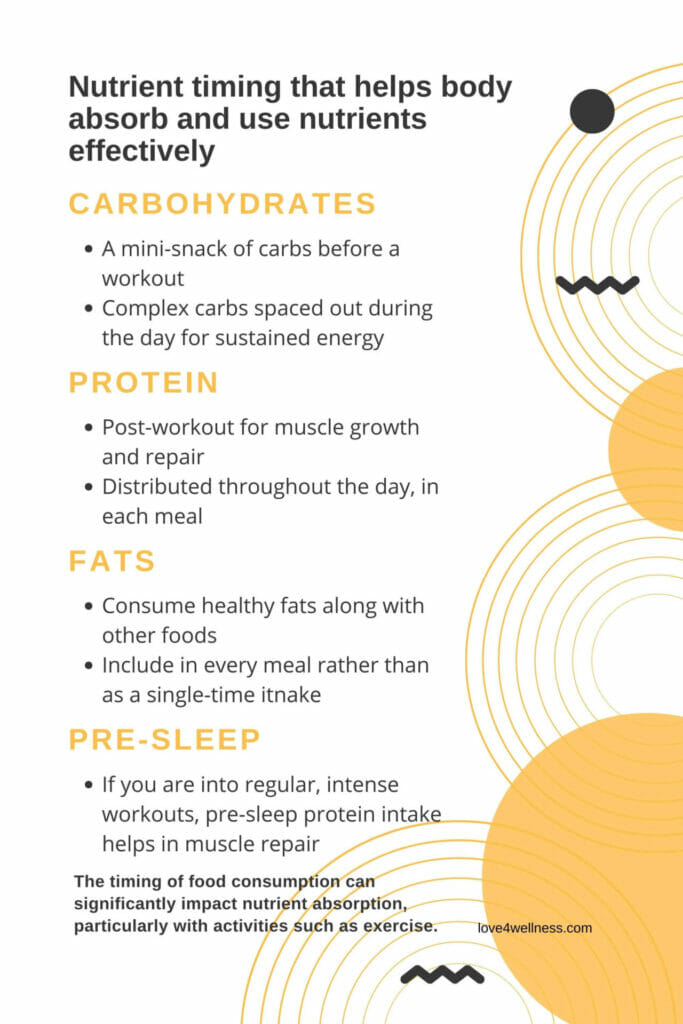At a glance: Not many think about nutrient absorption. We eat, enjoy the food, and move on with the day. However, some people, such as those with nutritional deficiencies or those who do intense workouts and want muscle strength, might look for ways to enhance their bodies ability to absorb nutrients. This article explores practical strategies and tips to improve nutrient absorption, unlocking the full potential of a balanced diet.
In the eager quest for a healthy life, we carefully plan our meals to ensure our bodies receive all the essential nutrients they need. However, it’s not just about what we eat but how effectively our bodies absorb those nutrients. Simply put a balanced diet alone may not guarantee optimal nutrient absorption. To truly harness the benefits of our food, we need to focus on enhancing our body’s ability to absorb and utilise nutrients. Here, we explore four important aspects that significantly affect your body’s ability to absorb nutrients from food.
1. Dietary strategies to improve nutrient absorption
i) Include foods from all food groups
The first step to improving nutrient absorption is to ensure a healthy and balanced meal containing foods from all essential food groups.
ii) Include high-fibre foods
High-fibre foods like whole grains, fruits, and vegetables help improve nutrient absorption. Fibre helps to slow down the digestion process, allowing the body more time to absorb the nutrients.
iii) Probiotics and prebiotics
A healthy gut is very important for efficient nutrient absorption. Hence, probiotic and prebiotic foods like yoghurt, Kefir, and kimchi can help enhance nutrient absorption by promoting gut health.
iv) Limit these foods
Studies show that taking tea or coffee with a meal or until 2 hours post-meal hinders nutrient absorption. Further, certain foods like coffee, alcohol, and processed foods should be limited as they can interfere with the absorption of specific nutrients, including calcium and iron.
v) Food combinations to improve nutrient absorption
It is interesting to know that pairing certain foods can help improve nutrient absorption.
For example, consuming vitamin C-rich foods like citrus fruits and iron-rich foods like spinach can help the body absorb iron better. Similarly, combining healthy fats like avocado or nuts with fat-soluble vitamins such as vitamin D can improve their absorption.
vi) Choose local produce
Our ancestors led a wholesome life by listening to nature and using locally grown grains, vegetables, and fruits. In hindsight, that is the wise way to live well, which is relevant even today.
If you think about it, seasonal vegetables and fruits cater to the nutrient needs during that season. For example, during summer, you tend to lose minerals through sweat, which you can compensate for with seasonal fruits like mangoes, papaya, watermelons, and jackfruit.
In addition, local produce means your veggies and fruits travelled less before getting into your kitchen, your local farmers are happy, and this is sustainable, so mother earth is pleased as well 🙂
Summary: In addition to avoiding caffeine and alcohol along with a meal, planning a balanced meal with foods from all food groups ensures optimal nutrient absorption. Further, pairing foods, such as vitamin C and iron-rich foods, can maximise the absorption of specific nutrients.
2. The power of healthy habits
Adopting healthy lifestyle habits is another crucial aspect of better nutrient absorption. While healthy habits maximise the absorption of nutrients, unhealthy ones will hinder absorption.
Some lifestyle habits that can affect nutrient absorption are:
- Stay hydrated to aid in the breaking down of food and nutrient absorption.
- Stress can lead to digestive problems and hinder nutrient absorption. So, aim to reduce stress levels with the help of various stress management techniques.
- Regular exercise improves digestion and, therefore, nutrient absorption.
- While a diet lacking essential nutrients affects sleep negatively, the converse is also true. Lack of sleep can affect your body’s ability to absorb nutrients. So prioritise sufficient sleep.
- Additionally, avoid smoking and alcohol consumption to optimise nutrient absorption.
Summary: Incorporating healthy habits, including managing stress, getting enough sleep, regular exercise, and limiting alcohol and smoking, can help to improve nutrient absorption and overall health.
3. Nutrient timing – Does when you eat matter?
For a moderately active person, balanced meal planning, comprising three moderate-sized meals with two snacks, is ideal for optimal nutrient absorption. And a balanced meal should contain all three macros, complex carbs, proteins and healthy fats, along with micronutrients from veggies. Also, fruits and nuts are ideal to be eaten alone for maximum nutrient absorption.
However, for highly active people, such as athletes, consuming specific nutrients at the right time can help maximise their absorption and utilisation by the body.
For example, a mini-snack of carbohydrates before a workout can provide energy, while protein and carbs post-workout can aid muscle recovery and growth. In addition, a slowly-digesting protein source before bed enables the body to use protein effectively for muscle repair.
Summary: The timing of food consumption can significantly impact nutrient absorption, particularly with activities such as exercise. Additionally, different nutrients require different timing strategies for optimal absorption.
4. Supplements to improve nutrient absorption
Supplements can help improve nutrient absorption, particularly when you suffer from nutritional deficiencies.
Supplement combinations to maximise nutrient uptake are:
- Probiotics: These live bacteria help absorb calcium, magnesium, and zinc minerals.
- Digestive Enzymes: These enzymes assist in breaking down macronutrients and help the body absorb them efficiently.
- Vitamin D helps the body absorb calcium and phosphorus, essential for strong bones and teeth.
- Iron: Iron supplements are crucial for people with iron-deficiency anaemia to improve nutrient absorption.
- Combination supplements: These supplements contain a blend of vitamins and minerals that work synergistically to maximise nutrient uptake.
Takeaway
Regardless of your activity level, optimising nutrient absorption can be achieved through simple yet impactful choices. Start by prioritising balanced meals and embracing the goodness of locally grown produce. Remember, hold off on indulging in tea or coffee until at least two hours after a meal to maximise nutrient absorption. Additionally, reducing smoking and alcohol intake will benefit your body’s ability to absorb nutrients effectively.
Food pairing offers a powerful tool for those with specific nutrient deficiencies, allowing you to address your unique needs. By strategically combining certain foods, you can maximise certain nutrient absorption, thus addressing nutritional deficiencies. You may also want to take supplements, but only with a health expert’s supervision.
Finally, for those engaged in intense workouts, timing matters. The time you consume carbs and proteins can significantly impact how effectively your body utilises these vital nutrients.
Images: canva.com



